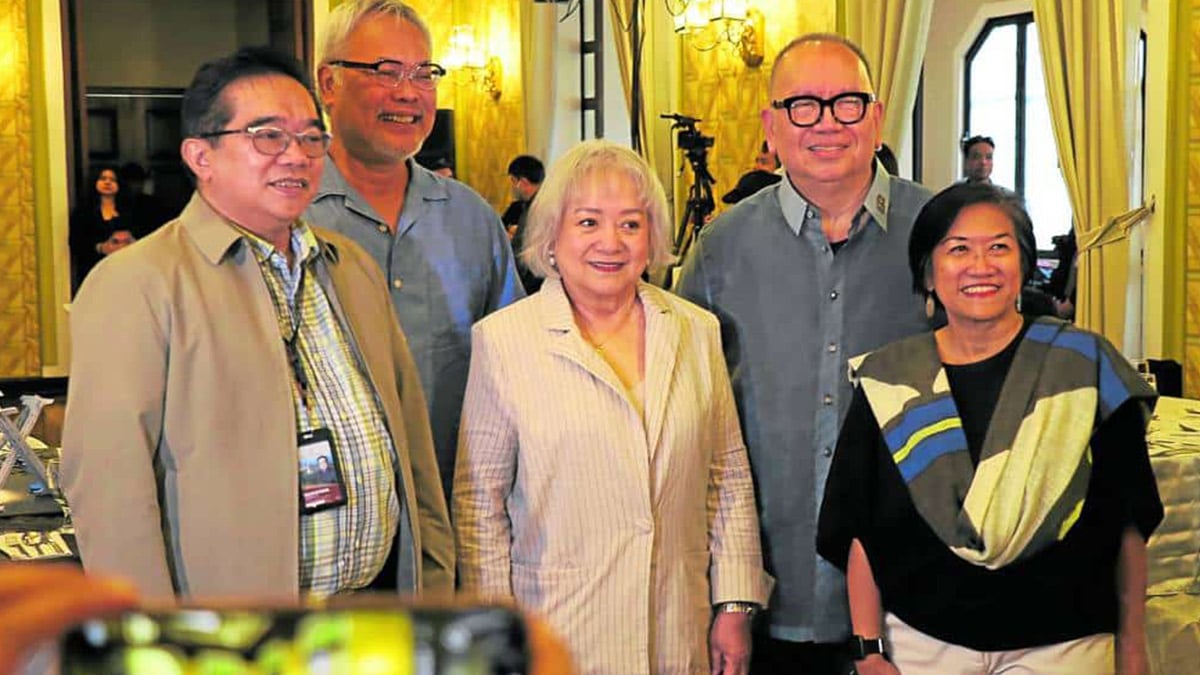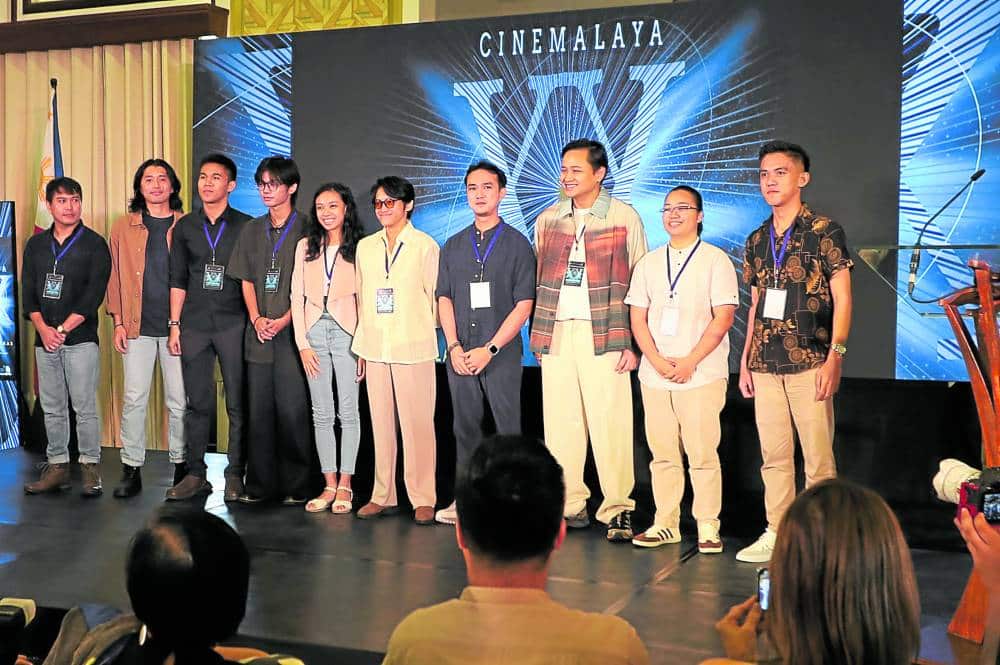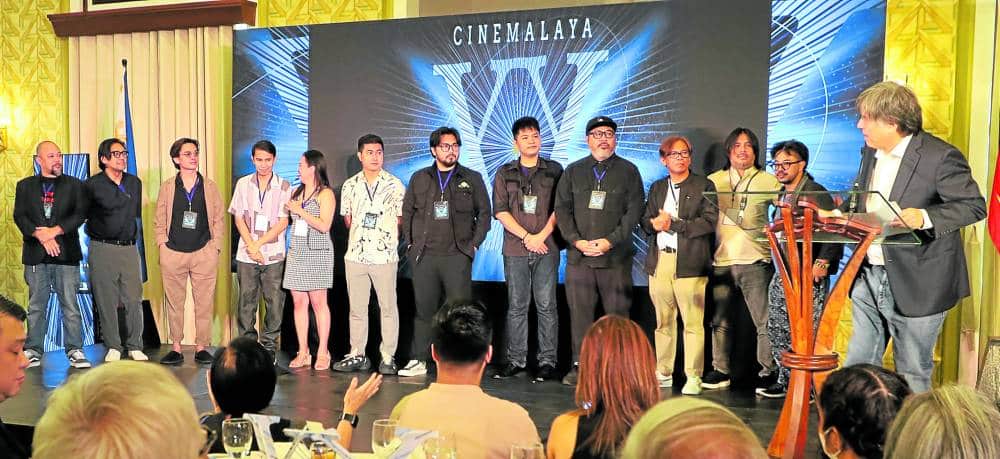20 years later, Cinemalaya still tells stories of triumphs, struggles

Cultural Center of the Philippines (CCP) artistic director Dennis Marasigan (left), Chris Millado, Laurice Guillen, Film Development Council of the Philippines chair Jose Javier Reyes and CCP administrative services department manager Tess Rances —KIKO CABUENA/CCP
The goal of this year’s Cinemalaya film festival is “to celebrate Philippine independent cinema’s strength, courage and depth,” said festival director Chris Millado. Over 100 films will be showcased from Aug. 2 to 11.
“Cinemalaya’s balanghay unmoors anew this August as it marks 20 years of navigating the cinematic imagination—still trusting the wind, the waves and the storied night sky … Thus, we are thrilled to present to you ‘Cinemalaya Beinte: May lakas, loob at lalim,’” Millado said in his welcome speech during the launch held at Metropolitan Theater on Wednesday.
With the Cultural Center of the Philippines (CCP) still under renovation, the Cinemalaya will have its run at Ayala Malls Manila Bay in Parañaque City. Opening the festival is Sheron Dayoc’s “Gospel of the Beast,” while the closing film is the newly restored version of Lino Brocka’s “Bona,” starring and produced by National Artist for Film Nora Aunor.
Among those in attendance at the launch were Cinemalaya founder and board chair Tonyboy Cojuangco, Film Development Council of the Philippines chair Jose Javier Reyes, CCP president Kaye Tinga, Cinemalaya competition and monitoring committee chair Carlitos Siguion-Reyna, and Cinemalaya Foundation president Laurice Guillen.
“For two decades, the films of our independent filmmakers have helped explore and define what is at the heart of the Filipino. Their stories, struggles and triumphs have given us a deeper understanding of our culture and identity, and this year is no different,” said Guillen. “Cinemalaya is really about community. Whether it’s volunteering, participating in events, promoting or just enjoying the films, there are plenty of ways to get involved and take pride in being a part of this festival.”
The 10 films in the main competition category are “the heart of the festival,” said Millado. “These films represent Cinemalaya’s daring to push boundaries and redefine Filipino storytelling.”
Competing under the full-length category are the following: JL Burgos’ “Alipato at Muog,” Dominic Bekaert and Sarge Lacuesta’s “An Errand,” Arlie Sweet Sumagaysay and Richard Jeroui Salvadico’s “Tumandok,” Kip Oebanda’s “Balota,” BC Amparado’s “Gulay Lang, Manong” (No More Than Veggies), Joshua Caesar Medroso’s “Kantil” (Trench), Jaime Pacena II’s “Kono Basho,” Jonathan Jurilla’s “Love Child,” Lawrence Fajardo and Honee Alipio’s “The Hearing,” and Julius Lumiqued’s “The Wedding Dance.”
Search for justice
Burgos started his documentary “Alipato at Muog” two days after his brother, activist Jonas Burgos, was kidnapped by armed men. “This was 17 years ago and he is still missing to this day. Imagine the process that this documentary went through during editing, which took six months to finish,” he began. “I joined Cinemalaya not for the competition, but for the community. I’m thankful to Cinemalaya for taking part in the search for my brother and for justice.”
Lacuesta recalled how Bekaert asked him to write the script based on “An Errand,” a short story he had previously published. “I’m thankful for having a director that made me the screenwriter that I am today,” he said. Bekaert added: “Putting out our first film today is a huge accomplishment. We’re thankful to Cinemalaya for championing personal stories.”
“Tumandok,” said Sumagaysay, is inspired by the Ati community in Iloilo. “What’s special about this is that the community members became our actors. It’s made for them and with them,” she added. Codirector Salvadico said funds raised from this film will help the community secure their land title. “By watching, you are helping them protect their homes,” he said.
Oebanda said “Balota,” starring Marian Rivera, is the “unfortunate” sequel to his debut film “Liway.” “It’s not fun for someone like me who experienced human rights violation during martial law to witness it again during the 2022 elections. I spent the majority of the time after thinking about how to help improve the political process here in the Philippines. Along the way, I discovered hundreds of stories of electoral violence, corruption and vote buying. So I turned it into a comedy that is also a suspense-thriller, because I feel that it should resonate with a broader audience.”
Make a stand
For Amparado, the message of “Gulay lang, Manong” is quite simple. “We want to spark conversations on why alternative medicine should be given a chance. Last week, we received a message from a woman dealing with stage 4 ovarian cancer. She asked us to help her find a source [for cannabis]. I made this movie for people like her. While her story tugs at our hearts, we can’t help her other than by making sure this film gets seen by many. Hopefully, this sparks interest until it forces our country’s decision-makers to make a definitive stand on the issue.”
“Kantil” is a queer sci-fi mystery drama set in Davao City. “Other than the queer element of the film, it’s about a community fighting for the right to keep their homes when a demolition order was served to give way to the construction of a commercial harbor in the area,” said Medroso. “This film is made by the people of Tibungco. The alienation and displacement of the Filipino poor is real and true here in the country.”
“Kono Basho” was shot entirely in Japan. “The whole film happens in Rikuzentakata City, a place destroyed by a tsunami in March 2011,” said Pacena. “It’s still rebuilding up to now. I’ve been there since 2013 as an artist and resident. Parts of what I witnessed some 10 years ago are included in the script.”
“Love Child,” said Jurilla, “depicts love and funny circumstances, but shows love in the real world, in a system that we have yet to learn to tolerate. It is based on my own experience as a father of a child with autism. This is for parents who are experiencing a different kind of life while taking care of children who are in the autism spectrum.”
“The Hearing,” starring Mylene Dizon, is inspired by stories told by a person working as a court interpreter, said Fajardo. “A story on a rape case sparked the idea to do this kind of movie. As an artist who has done films of different genres, this one is personal. Since our subject is a deaf-mute boy, this is a film that hopes to give voice to children like him.”
“The Wedding Dance” is based on the short story of the late Cordilleran literary writer Amador Dagio. “As someone from Cordillera, I’m grateful that our film got picked. It is based on a story by one of our best English writers of Filipino literature. This is one way to reopen his legacy,” said Lumiqued. “This is a short story, but when turned into a film, expect unexpected things. Ultimately, it is a story that the Cordillerans want to tell.”
The short feature films in competition are: PR Monencillo Patindol’s “Abogbaybay,” Cris Bringas’ “All This Wasted Space,” Rey Anthony Villaverde’s “Ambot Wa Ko Kabalo Unsay I-title Ani,” Sam Manacsa’s “Cross My Heart and Hope to Die,” Ryan Capili’s “I was Walking on the Streets of Chinatown,” Alexandra Brizuela’s “Mama,” Melanie Faye Tampos’ “Mariposa,” Breech Asher Harani’s “Pamalandong sa Danow” (Reflection in the Marsh), Sonny Calvento’s “Primetime Mother,” and Mariel Ritchie Jolejole and Roniño Dolim’s “The Red Trails” (An Baga sa Dalan). INQ

